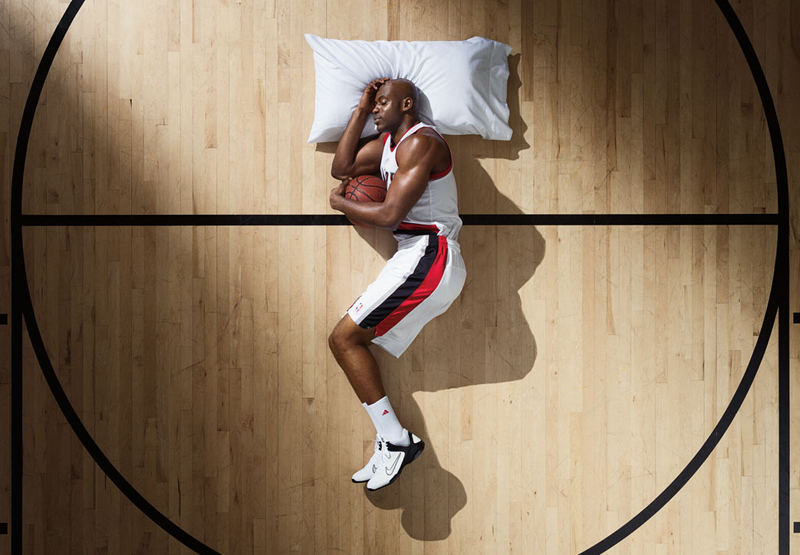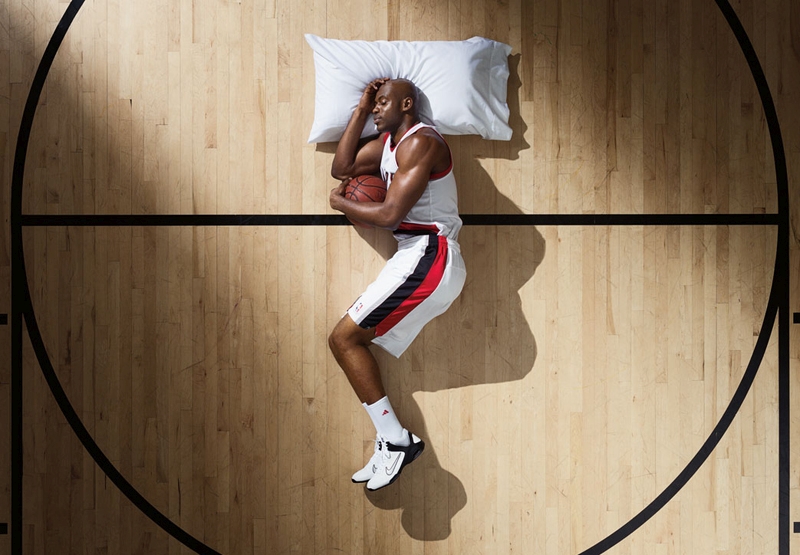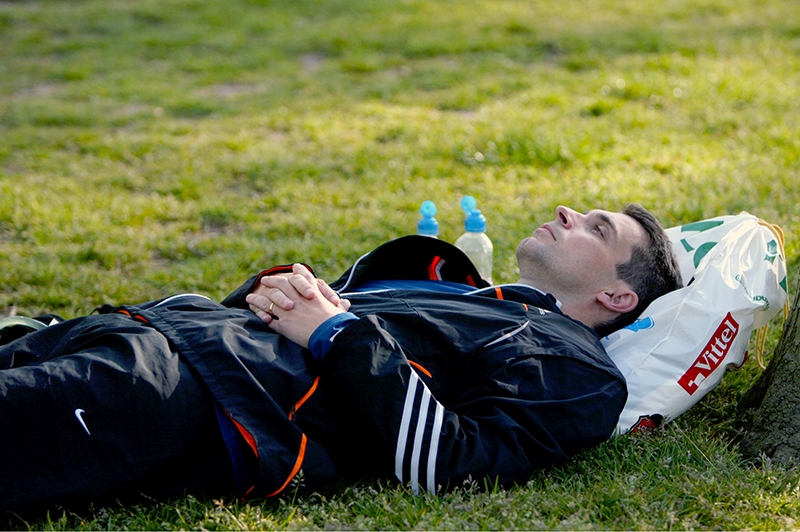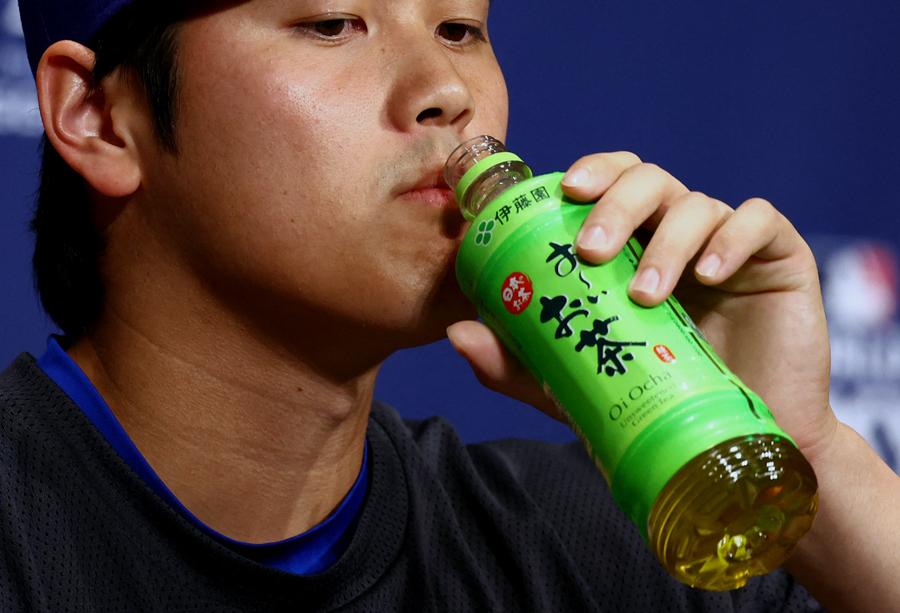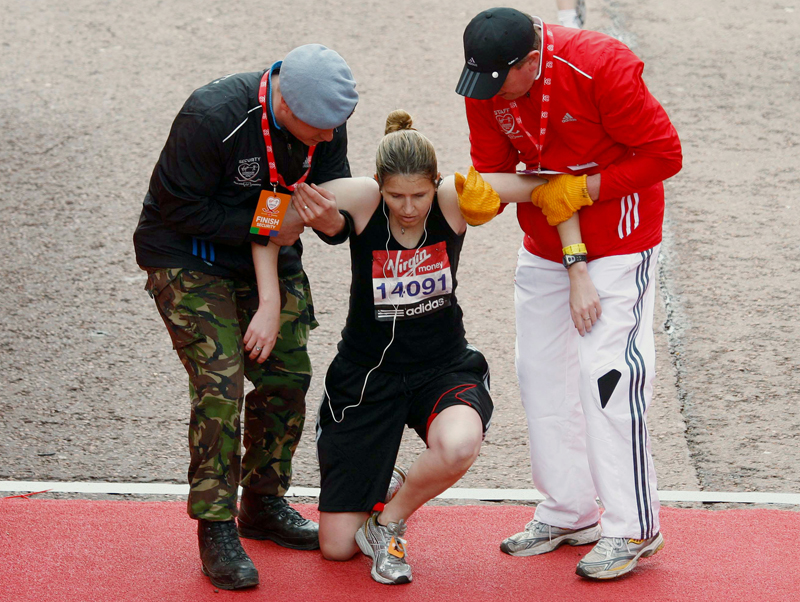Sleep loss - make sure it doesn't affect your training
In our modern caffeine-fuelled, ‘sleep when you’re dead’ society, it’s easy to form the impression that sleep is not important. The high use of caffeinated sports drinks and pre-workout pick-up formulas by athletes and sports people suggests that it is not just overworked office workers and late night clubbers who are falling into the trap of believing that sleep is not entirely beneficial or useful.
In fact, recent surveys and scientific studies suggest that chronic sleep loss due to the combination of voluntary bed time restriction and poor quality of sleep is an endemic condition in modern society (1,2,3). The trend to push sleep aside to make room for busier lives shows no sign of abating and most people are now carrying some degree of sleep debt.
In a recent British national sleep survey, 18% of people reported that their sleep was insufficient on the majority of nights, and nearly 60% of people reported insufficient sleep on one or more nights of the previous week (1). It is not just the amount of time in bed that’s important; difficulty getting off to sleep or disturbed, restless sleep can also create a significant sleep debt.
In sportsmen and women, the issue of the sleep deprivation problem is not confined to amateur athletes trying to fit training and competition around busy work schedules. Professional sportsmen and women are also vulnerable.
A recent high-profile example of sleep disturbance in professional sport occurred in the 2006 Tour of California. Top American cyclist Levi Leipheimer looked set for an important victory, having won the opening prologue time trial and ridden strongly in the mountains. He was upbeat about the possibility of taking the overall lead in the next important trial stage, and was the firm favourite for a home win. However, a poor night’s sleep meant he was far from fresh in the time trial and a mediocre performance by his standards put him out of contention for overall victory.
Although scientific studies and health bulletins have been talking about restricted and poor quality sleep as a potential health problem for many years, until recently it was still largely thought that sleep was needed purely for the mind. However, sleep deprivation became an increasing health concern with the rising occurrence of traffic and work-related accidents resulting from poor concentration, or people falling asleep whilst in charge of vehicles or machinery. Sleep deprivation is also thought to have played a large role in many large-scale public disasters such as the 1989 Exxon Valdez oil tanker accident (4).
Mind and body
If sleep was needed purely for the mind, athletes could almost have been forgiven for thinking that it was more important just to ‘get the workouts done’ no matter how tired they felt. If they felt they had not had sufficient sleep then exercising a little mind over matter, helped perhaps by a few strong coffees, would merely make them stronger.However, this approach is changing, as there is now a considerable body of evidence showing that sleep has a huge role in regulating many physiological functions. According to a recent issue of Nature we are ‘Waking up to the importance of sleep’ and ‘A growing chasm separates the growing scientific understanding of sleep, and the widespread public assumption that it just doesn’t matter’ (4).
Health problems
There is mounting evidence that insufficient or poor quality sleep doesn’t just compromise short-term physical performance, it is also associated with a host of serious health problems including weight gain, insulin resistance, type-2 diabetes and cardiovascular disease (5,6,7,8,9).As little as six days with sleep duration restricted to four hours per night has been shown to alter the hormone profiles of healthy young people so dramatically that they effectively replicate those typically found in elderly or depressed individuals (2).
Other researchers have applied sleep research to athletic performance. A recent issue of Psychiatric News suggests that ‘Sleep May Be Athletes’ Best Performance Booster’ (10). And such has been the interest in sleep and sports performance that an entire issue of Clinics in Sports Medicine has been dedicated to this subject and published in a book format as Sports Chronobiology (11).
The New England Journal of Medicine recently described sleep as ‘a new cardiovascular frontier’, highlighting the cardiovascular implications of normal and disturbed sleep(12), and recent research has shown that sleep deprivation can reduce cardiovascular performance by 11%, slow glucose metabolismby 30-40% and result in other changes that indicate possible accelerated ageing (6, 13, 14).
Hormones and sleep
Sleep deprivation is associated with a series of hormonal changes involving ghrelin and leptin (see box). In particular, restricted sleep has been associated with reduced leptin levels, increased ghrelin levels and elevated body mass index (15).These hormonal changes can lead to increased hunger and appetite, making it more difficult to achieve the low body fat levels required for success in many sports. In one recent study, two days of restricted sleep resulted in an increased appetite of calorie-dense high carbohydrate foods, including sweets, salty snacks and starchy food, by 33-45% (6).
The quality of sleep is as important as duration. Sleep fragmentation due to fidgeting, restless legs or difficulty getting off to sleep can all combine with reduced sleep duration to contribute to sleep deficiency. Studies have also shown that sleep debt is cumulative, so even small amounts of sleep shortfall on a regular basis can accumulate to levels sufficient to compromise health and performance until that sleep debt is repaid (11).
Sleep and activity
Sports scientists working with coaches are beginning to use high technology actigraph devices to help monitor and improve sleep in athletes (16). Although it is commonly believed that exercise improves sleep quality, there is little in the way of scientific evidence to support this notion. Whilst some exercise may improve sleep in sedentary populations, sleep disorders are common in elite athletes and sleep disruption becomes more common with increased training volume (17) Athletes often report limbs that ‘can’t stop running’ much in the same way that a racing mind can disturb sleep in stressed executives.Periodic limb movement or ‘restless leg syndrome’ is a well known cause of disturbed sleep, and indicates a link between nutrition and sleep quality that goes far deeper than caffeinated beverages, alcohol or large meals at night reducing the quality of sleep.
There are, in fact, many nutrients within food that can help reduce the time taken to fall asleep, while others have a more complex relationship – eg where poor sleep may help create a deficiency, or a nutrient deficiency may result in poor sleep quality.
Poor sleep and suboptimal nutrition can both result in reduced exercise performance and in many cases it is difficult to find the initial cause of an accelerating downward spiral. This is especially important because many studies have suggested that suboptimal nutrition status in important ‘sleep’ minerals is far from uncommon.
In athletes, these problems can be compounded because the energy demands often place additional strain on these important nutrients. An over-reliance on cow’s milk and milk products may also result in mineral and amino acid concentrations that are not conducive to good sleep.
Protein, tryptophan and sleep
Another nutrient that has a major impact on sleep is tryptophan, which is one of the essential amino acid building blocks of protein. Tryptophan is used directly to synthesise the brain neurotransmitterserotonin and the sleep hormone melatonin, and so effective is it at raising the levels of these hormones that it was used as an effective hypnotic for many years.Tryptophan is well tolerated and without tolerance effects; however, it was banned for many years after an outbreak of eosinophilia myalgia syndrome was linked to the supplement (18, 19, 20). It was later concluded that this condition was not caused by tryptophan itself, but possibly by a contamination, and tryptophan has been allowed into supplements since November 2005 albeit at very low doses.
However, partly due to the ban, much effort was focused on finding natural proteins high in tryptophan, particularly relative to the other large ‘neutral’ amino acids. This is because tryptophan competes with other neutral amino acids for entry into the brain, so when trying to increase uptake into the brain (to boost serotonin and melatonin synthesis), it is the ratio of tryptophan that is important.
Much focus has been centred on the milk protein fraction alpha-lactalbumin, which is a natural protein source with the highest tryptophan content relative to other large neutral amino acids. Alpha-lactalbumin is found in human breast milk and cow’s milk; however, the principle whey protein in cow’s milk is beta-lactoglobulin, a low-tryptophan protein that is not found in human milk.
Efforts have been made over recent years to isolate alpha-lactalbumin for use in the human infant formula and it’s now possible to produce alpha-lactalbumin on a commercial scale(24). Researchers have therefore investigated its effectiveness in raising plasma tryptophan levels to see if it could be used in a similar way to tryptophan supplements(25). Studies have shown that alpha-lactalbumin taken in an evening beverage reduces the subjective rating of insomnia and time awake during the night, improves sleep, and increases morning alertness and brain measures of attention(26,27).
Contrary to popular belief, milk is not an ideal bedtime drink; not only does it have a relatively low tryptophan content (because cow’s milk contains protein fractions not found in human milk), it also contains large amounts of calcium, which can reduce zinc and magnesium uptake – important minerals for sleep and growth/recovery.
Low tryptophan levels in athletes
The use of protein powders and amino acid supplements for recovery and weight gain in athletic populations has rocketed in recent years. However, it is possible that the amino acid profile of proteins typically used by athletes and sports people could contribute to sleep disturbance by reducing the availability of tryptophan to the brain. Many of these protein powders are high in branched-chain amino acids and whey proteins high in beta-lactoglobulin. Both of these contain high levels of large neutral amino acids, which compete with tryptophan for absorption (28).The general trend for low-carbohydrate/high-protein foods may also contribute to high levels of competing amino acids; carbohydrate consumption will typically result in an insulin response that drives branched-chain amino acids into muscle tissue, which effectively increases the plasma levels of tryptophan.
Summary
Sleep deprivation is a growing problem, and one that can significantly impair performance in athletes. It’s also an area that’s easily overlooked in the rush to fit training schedules around work and family commitments. If you suspect you’re not getting all the sleep you need, addressing your sleep shortage may pay far more dividends than an extra training session here and there.Sleep tips
- Avoid caffeine-containing drinks after 3pm as they can increase the time taken to fall asleep at bedtime;
- Avoid alcohol use in the three-hour period before bedtime. It may help you to fall asleep, but it can lead to disturbed sleep later in the night;
- Don’t eat a large meal before retiring for the night. By the same token, don’t go to bed hungry, especially if you’ve trained that evening as you may awaken later in the night with hunger pangs;
- If you’re suffering from sleep problems, try to increase your intake of magnesium-rich foods (beans, peas, lentils, nuts, seeds, wholegrain breads and cereals, and green leafy vegetables); magnesium supplements may be also useful;
- Make sure your bed is comfortable; experiment with mattresses and pillows to increase sleeping comfort;
- Keep your bedroom well ventilated, quiet and cool;
- Go to bed when you’re sleepy/tired, not when it’s time to go to bed by habit;
- Take the time to wind down before bedtime. Don’t get involved in any kind of anxiety-provoking activities or thoughts in the 90 minutes before bedtime;
- Try getting an extra hour’s sleep every night for two weeks and see how your performance improves.
References
1. Journal of Sleep Research 2004; 4(13):359-371
2. Rev Neurol (Paris) 2003; 159(11 Suppl):6S11-20
3. US National Sleep Survey, National Sleep Foundation; www.sleepfoundation.org
4. Nature 27 October 2005; 437:7063
5. Eur Respir J 2003; 22(1):156-60
6. Ann Intern Med 2004; 141:846-850
7. Curr Opin Pulm Med 2002; 8(6):502-5
8. J Clin Endocrin Metab 2004; 89(11):5762-5771
9. J Appl Physiol 2005; 99(5):2008-19
10. Psychiatric News 2005; 40(16)
11. Sports Chronobiology Clinics in Sports Medicine 2005; 24(2)
12. N Engl J Med 2005; 353:2070-2073
13. Lancet 1999 23;354(9188):1435-9
14. Strength and Conditioning Journal 2002; 24(2):17-24
15. Sleep 2004; 27(Abst Suppl):A146-7
16. ‘Sleeping on it’ English Institute of Sport Website: www.eis2win.co.uk
17. Med Sci Sports Exerc 1997; 29(5):688-93
18. Psychopharmacology (Berl) 1986; 89(1):1-7
19. Pharmacopsychiatry 1987; 20(6):242-4
20. Klin Wochenschr, Eosinophilia 1990; 68(14):739-42
21. Sleep 1998; 1;21(5):501-5
22. Jpn Circ J 1998; 62(5):341-6
23. J Magnes Res 1990; 3(2):93-102
24. Andrews AT, Varley J Biochemistry of Milk Products, 1994
25. Nutr Neurosci 2005; 8(2):121-7
26. Am J Clin Nutr 2002; 75(6):1051-6
27. Am J Clin Nutr 2005; 81: 1026-33
28. J Nutr 2005; 135(6 Suppl):1539S-46S
Hormones and sleep
Sleep deprivation is associated with a series of hormonal changes involving ghrelin and leptin (see box). In particular, restricted sleep has been associated with reduced leptin levels, increased ghrelin levels and elevated body mass index (15).
These hormonal changes can lead to increased hunger and appetite, making it more difficult to achieve the low body fat levels required for success in many sports. In one recent study, two days of restricted sleep resulted in an increased appetite of calorie-dense high carbohydrate foods, including sweets, salty snacks and starchy food, by 33-45%(6).
The quality of sleep is as important as duration. Sleep fragmentation due to fidgeting, restless legs or difficulty getting off to sleep can all combine with reduced sleep duration to contribute to sleep deficiency. Studies have also shown that sleep debt is cumulative, so even small amounts of sleep shortfall on a regular basis can accumulate to levels sufficient to compromise health and performance until that sleep debt is repaid(11).
Sleep and activity
Sports scientists working with coaches are beginning to use high technology actigraph devices to help monitor and improve sleep in athletes(16). Although it is commonly believed that exercise improves sleep quality, there is little in the way of scientific evidence to support this notion. Whilst some exercise may improve sleep in sedentary populations, sleep disorders are common in elite athletes and sleep disruption becomes more common with increased training volume(17) Athletes often report limbs that ‘can’t stop running’ much in the same way that a racing mind can disturb sleep in stressed executives.
Periodic limb movement or ‘restless leg syndrome’ is a well known cause of disturbed sleep, and indicates a link between nutrition and sleep quality that goes far deeper than caffeinated beverages, alcohol or large meals at night reducing the quality of sleep.
There are, in fact, many nutrients within food that can help reduce the time taken to fall asleep, while others have a more complex relationship – eg where poor sleep may help create a deficiency, or a nutrient deficiency may result in poor sleep quality.
Poor sleep and suboptimal nutrition can both result in reduced exercise performance and in many cases it is difficult to find the initial cause of an accelerating downward spiral. This is especially important because many studies have suggested that suboptimal nutrition status in important ‘sleep’ minerals is far from uncommon.
In athletes, these problems can be compounded because the energy demands often place additional strain on these important nutrients. An over-reliance on cow’s milk and milk products may also result in mineral and amino acid concentrations that are not conducive to good sleep.
Protein, tryptophan and sleep
Another nutrient that has a major impact on sleep is tryptophan, which is one of the essential amino acid building blocks of protein. Tryptophan is used directly to synthesise the brain neurotransmitter serotonin and the sleep hormone melatonin, and so effective is it at raising the levels of these hormones that it was used as an effective hypnotic for many years.
Tryptophan is well tolerated and without tolerance effects; however, it was banned for many years after an outbreak of eosinophilia myalgia syndrome was linked to the supplement(18, 19, 20). It was later concluded that this condition was not caused by tryptophan itself, but possibly by a contamination, and tryptophan has been allowed into supplements since November 2005 albeit at very low doses.
However, partly due to the ban, much effort was focused on finding natural proteins high in tryptophan, particularly relative to the other large ‘neutral’ amino acids. This is because tryptophan competes with other neutral amino acids for entry into the brain, so when trying to increase uptake into the brain (to boost serotonin and melatonin synthesis), it is the ratio of tryptophan that is important.
Much focus has been centred on the milk protein fraction alpha-lactalbumin, which is a natural protein source with the highest tryptophan content relative to other large neutral amino acids. Alpha-lactalbumin is found in human breast milk and cow’s milk; however, the principle whey protein in cow’s milk is beta-lactoglobulin, a low-tryptophan protein that is not found in human milk.
Efforts have been made over recent years to isolate alpha-lactalbumin for use in the human infant formula and it’s now possible to produce alpha-lactalbumin on a commercial scale(24). Researchers have therefore investigated its effectiveness in raising plasma tryptophan levels to see if it could be used in a similar way to tryptophan supplements(25). Studies have shown that alpha-lactalbumin taken in an evening beverage reduces the subjective rating of insomnia and time awake during the night, improves sleep, and increases morning alertness and brain measures of attention(26,27).
Contrary to popular belief, milk is not an ideal bedtime drink; not only does it have a relatively low tryptophan content (because cow’s milk contains protein fractions not found in human milk), it also contains large amounts of calcium, which can reduce zinc and magnesium uptake – important minerals for sleep and growth/recovery.
Low tryptophan levels in athletes
The use of protein powders and amino acid supplements for recovery and weight gain in athletic populations has rocketed in recent years. However, it is possible that the amino acid profile of proteins typically used by athletes and sports people could contribute to sleep disturbance by reducing the availability of tryptophan to the brain. Many of these protein powders are high in branched-chain amino acids and whey proteins high in beta-lactoglobulin. Both of these contain high levels of large neutral amino acids, which compete with tryptophan for absorption(28).
The general trend for low-carbohydrate/high-protein foods may also contribute to high levels of competing amino acids; carbohydrate consumption will typically result in an insulin response that drives branched-chain amino acids into muscle tissue, which effectively increases the plasma levels of tryptophan.
Summary
Sleep deprivation is a growing problem, and one that can significantly impair performance in athletes. It’s also an area that’s easily overlooked in the rush to fit training schedules around work and family commitments. If you suspect you’re not getting all the sleep you need, addressing your sleep shortage may pay far more dividends than an extra training session here and there.
Sleep tips
- Avoid caffeine-containing drinks after 3pm as they can increase the time taken to fall asleep at bedtime;
- Avoid alcohol use in the three-hour period before bedtime. It may help you to fall asleep, but it can lead to disturbed sleep later in the night;
- Don’t eat a large meal before retiring for the night. By the same token, don’t go to bed hungry, especially if you’ve trained that evening as you may awaken later in the night with hunger pangs;
- If you’re suffering from sleep problems, try to increase your intake of magnesium-rich foods (beans, peas, lentils, nuts, seeds, wholegrain breads and cereals, and green leafy vegetables); magnesium supplements may be also useful;
- Make sure your bed is comfortable; experiment with mattresses and pillows to increase sleeping comfort;
- Keep your bedroom well ventilated, quiet and cool;
- Go to bed when you’re sleepy/tired, not when it’s time to go to bed by habit;
- Take the time to wind down before bedtime. Don’t get involved in any kind of anxiety-provoking activities or thoughts in the 90 minutes before bedtime;
- Try getting an extra hour’s sleep every night for two weeks and see how your performance improves.
Tim Lawson is a sport scientist and founding director of SiS (Science in Sport) Ltd, who still cycles competitively as a category 1 racer and who holds a world masters medal
References
1. Journal of Sleep Research 2004; 4(13):359-371
2. Rev Neurol (Paris) 2003; 159(11 Suppl):6S11-20
3. US National Sleep Survey, National Sleep Foundation; www.sleepfoundation.org
4. Nature 27 October 2005; 437:7063
5. Eur Respir J 2003; 22(1):156-60
6. Ann Intern Med 2004; 141:846-850
7. Curr Opin Pulm Med 2002; 8(6):502-5
8. J Clin Endocrin Metab 2004; 89(11):5762-5771
9. J Appl Physiol 2005; 99(5):2008-19
10. Psychiatric News 2005; 40(16)
11. Sports Chronobiology Clinics in Sports Medicine 2005; 24(2)
12. N Engl J Med 2005; 353:2070-2073
13. Lancet 1999 23;354(9188):1435-9
14. Strength and Conditioning Journal 2002; 24(2):17-24
15. Sleep 2004; 27(Abst Suppl):A146-7
16. ‘Sleeping on it’ English Institute of Sport Website: www.eis2win.co.uk
17. Med Sci Sports Exerc 1997; 29(5):688-93
18. Psychopharmacology (Berl) 1986; 89(1):1-7
19. Pharmacopsychiatry 1987; 20(6):242-4
20. Klin Wochenschr, Eosinophilia 1990; 68(14):739-42
21. Sleep 1998; 1;21(5):501-5
22. Jpn Circ J 1998; 62(5):341-6
23. J Magnes Res 1990; 3(2):93-102
24. Andrews AT, Varley J Biochemistry of Milk Products, 1994
25. Nutr Neurosci 2005; 8(2):121-7
26. Am J Clin Nutr 2002; 75(6):1051-6
27. Am J Clin Nutr 2005; 81: 1026-33
28. J Nutr 2005; 135(6 Suppl):1539S-46S
Newsletter Sign Up
Testimonials
Dr. Alexandra Fandetti-Robin, Back & Body Chiropractic
Elspeth Cowell MSCh DpodM SRCh HCPC reg
William Hunter, Nuffield Health
Newsletter Sign Up
Coaches Testimonials
Dr. Alexandra Fandetti-Robin, Back & Body Chiropractic
Elspeth Cowell MSCh DpodM SRCh HCPC reg
William Hunter, Nuffield Health
Keep up with latest sports science research and apply it to maximize performance
Today you have the chance to join a group of athletes, and sports coaches/trainers who all have something special in common...
They use the latest research to improve performance for themselves and their clients - both athletes and sports teams - with help from global specialists in the fields of sports science, sports medicine and sports psychology.
They do this by reading Sports Performance Bulletin, an easy-to-digest but serious-minded journal dedicated to high performance sports. SPB offers a wealth of information and insight into the latest research, in an easily-accessible and understood format, along with a wealth of practical recommendations.
*includes 3 coaching manuals
Get Inspired
All the latest techniques and approaches
Sports Performance Bulletin helps dedicated endurance athletes improve their performance. Sense-checking the latest sports science research, and sourcing evidence and case studies to support findings, Sports Performance Bulletin turns proven insights into easily digestible practical advice. Supporting athletes, coaches and professionals who wish to ensure their guidance and programmes are kept right up to date and based on credible science.
